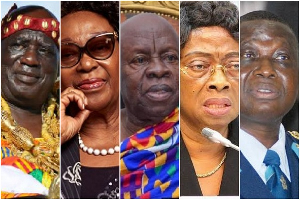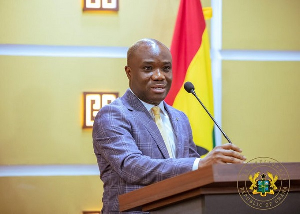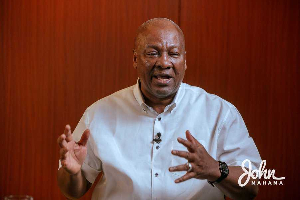As a statesman known for speaking his mind, Rawlings seized power twice in military coups to curb corruption and restore democracy and the rule of law but his regime is accused of orchestrating human rights abuses, including torture and the killing of his opponents.
The PNDC'S house cleaning exercise soon degenerated into a lip service thanks to Rawlings' henchmen. In the midst of the many egoistic advisors everything soon got back to normal and then worse because the center could not hold. Corruption and white color crime rocketed between 1992 and 2000.
For instance it is reported that the Office for Special Duties of the Ministry of Finance and Economic Planning in collaboration with the Auditor-General's Department between 2001 and 2004 investigated and identified 10 trillion cedis embezzled funds between 1992 and 2000 (GNA March 20, 2006).
An apology must not be too much to ask for in politics. Humility is a mark of good leadership The Holy Father, Pope John Paul II apologized on behalf of the Catholic Church for past faults and errors by the church, including slavery (Reuters, 2000-MAR-1. See: http://dailynews.yahoo.com/). Does it make him less of a saint? No. If Gen. Afrifa and the NLC need to apologise for overthrowing the government of the CPP under Osagyefo Dr. Kwame Nkrumah on February 24, 1966 then why not Flt. Lt J.J Rawlings or any of the living coup plotters? By definition of the military in politics, J.J. Rawlings in my opinion can only be justified for overthrowing the military dictatorship of the SMC II in 1979 and restoring political sanity back to Ghana. For this Ghana is very grateful.
Besides this he has no justification for his repeated coups especially when he still hanged on to power for two decades and repeated the same mistakes of the previous government(s). Ghana needs to pause and ask: What has Ghana benefited from these coups? You be the judge.
For the purposes of our discussion let us take a brief look at our history and examine the facts. According to Dr. Rawlings,
?The attempt to justify the action of 31 December, 1981, would not presuppose that we Ghanaians do not know and feel what had been going on since September 24, 1979. Briefly, it has been nothing short of a clear denial of our fundamental rights as a people to enjoy the wealth of our labor. This has been the most disgraceful government in the history of our country. It is the only one in recent times that criminals and such others like them have become respectable in our society. They have turned our hospitals into graveyards and our clinics into death transit camps where men, women and children die daily because of lack of drugs and basic equipment. To many of us, democracy does not just mean paper guarantees of abstract liberties. It involves, above all, food, clothing, and shelter in the absence of which life is not worth living? (Rawlings in his address to the nation following the December 31 1981 coup).
The emphasis of the ERP by the Rawlings regime was predicated on increased production in agriculture and industry, combined with reducing the budget deficit by cutting government subsidies and establishing a more efficient revenue mobilization and collection. Although the influence of external interest is said to have increased under the economic liberalization policies of the PNDC, including donor agencies and multi-national corporations (MNCs), Ghana is yet o see the benefits of the P/NDC structural adjustment and the so called profit margins generated from her price liberalization policy during the 1980s and early 1990s.
During the mid-1980s, massive devaluation of the currency, from 2.75 to the U.S. dollar to over 390 in 1991, generated a severe liquidity crisis; companies that depended on imported machinery and raw materials thus suffered from higher prices of imported goods. The problem was exacerbated by a tight credit policy that resulted from high interest rates designed to curb inflation (As cited in Adedeji, J.L. 2001). We are still witnessing the spilling effects of such policies. The alleviation of economic and social conditions in Ghana was very brief, to say the least. Instead Ghanaians became bitter about human rights abuses, such as harassment and false detention, and then demanded protection of civil rights while criticizing the regime for loss of revolutionary ideals that initially brought it to power. Today we are seeing the real impact of the SAP.
The privatization measures only benefited the NDC executives/hierarchy as they were the ones who were able to "buy up" or "buy into" state-owned enterprises (SOEs) at concessional prices.
Furthermore, in launching of the 31 December, 1981 coup, his concern was consistently been focused on the poor and the exploited and his declarations of ?power to the people?. "Fellow Ghanaians, the time has come for us to restructure this society in a real and meaningful democratic manner so as to ensure the involvement and active participation of the people in the decision-making process." (Ministry of Information. J.J. Rawlings, Selected Speeches vol. 3. Accra, Ghana: Ministry of Information, 1990. p.18-19.). But what did we see between 1990 and 2000? Ghanaians became bitter about human rights abuses, such as harassment and false detention, and then demanded protection of civil rights while criticizing the regime for loss of revolutionary ideals that initially brought it to power
Let the facts speak for itself. On February 24, 1966 the-1st republic was overthrown by the military. The military ceased power again in 1972 in a bloodless coup headed by Colonel. Kutu Acheampong. of the National Redemption Council (NRC). The name of the NRC was later changed to the Supreme Military Council (SMC). General Acheampong was replaced by General F.W.K. Akuffo in a palace coup in July 1978 which resulted into SMC 2. On June 4, 1979, some junior officers in an uprising stole power with the sole aim of conducting some military housecleaning. This was following an unsuccessful coup attempt in May 15th led by Flt Lt. J.J Rawlings. An Armed Forces Revolutionary Council (AFRC) was set up under the chairmanship of Flt.-Lt. Jerry John Rawlings in 1979. On September 24, 1979, the AFRC handed over power to the civilian administration of Dr. Hilla Limann. However on December 31, 1981 the constitutional PNP government was replaced by the PNDC military led by Flt. Lt. J.J. Rawlings. Flt.-Lt. Rawlings became the Chairman of a nine-member Provisional National Defence Ruling Council, (PNDC). In 1983 there was an attempted coup to overthrow the PNDC by other junior army men but to no avail.
We need the military. They play a very vital role in maintaining peace in our democracy. We have very intelligent soldiers, brilliant war strategists and first class engineers; very fine and noble gentlemen (and women) but they are not trained to rule. This author admires their discipline and wondered why it does not translate into politics. Notwithstanding all the positive aspects of the military managing people or ruling a civil society (in peace time) is not their cup of tea. The answer is simple; the military is not trained to rule a country. President Kufuor started well with a determination to turn the Ghanaian economy around during his first term of office.



















